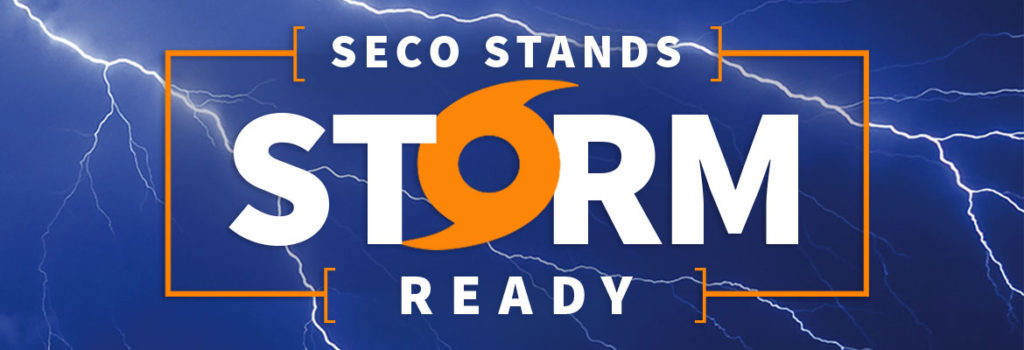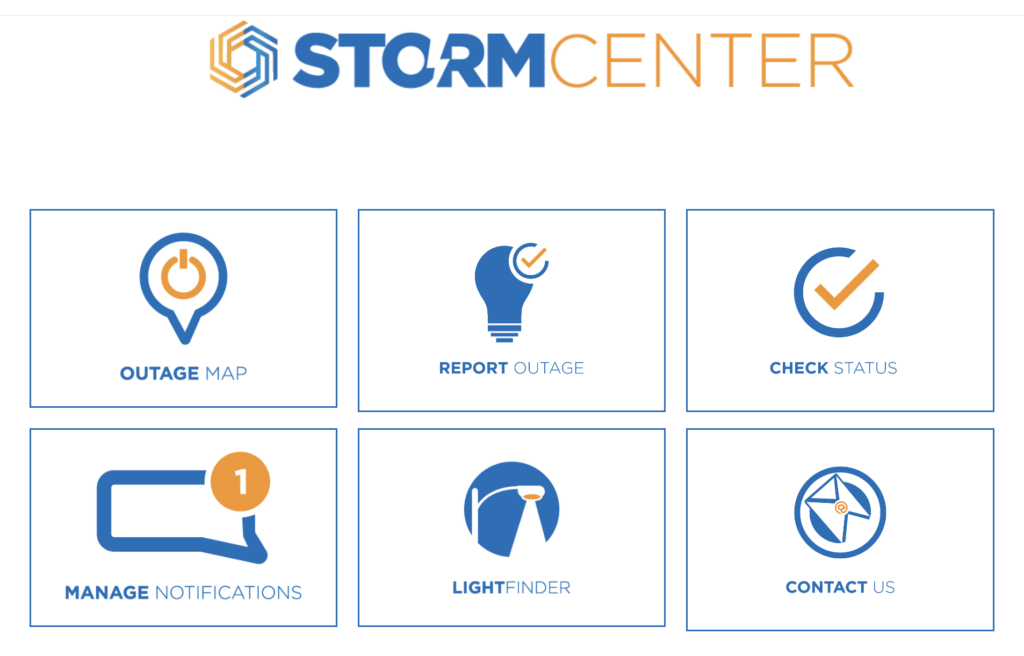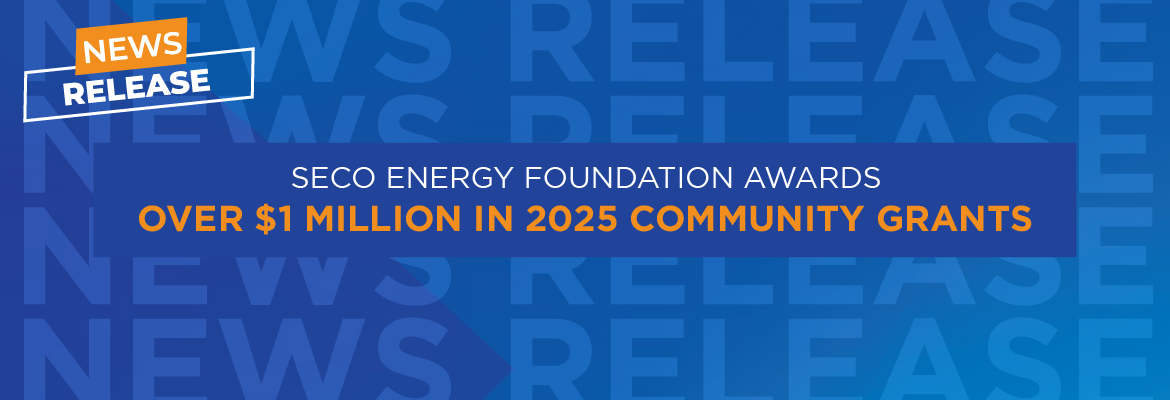SECO News September 2023
 Dear Members,
Dear Members,
I have great news to share with you this month – Hot Bucks are back and reduce the residential bill to the lowest cost in the last five years! SECO Energy is happy to announce a significant reduction on your electric bill.
Hot Bucks (which is known formally as the PCA short for Power Cost Adjustment) will display as a line item on your monthly billing statement. The credit will appear on bills beginning October 1 to reflect prior period usage from September.
SECO’s Hot Bucks are a direct reflection of the price variation the cooperative pays for power purchased from Seminole Electric Cooperative. Natural gas is the main fuel source for power generation and a continued downward trend in price is projected as we move into the latter part of the summer.
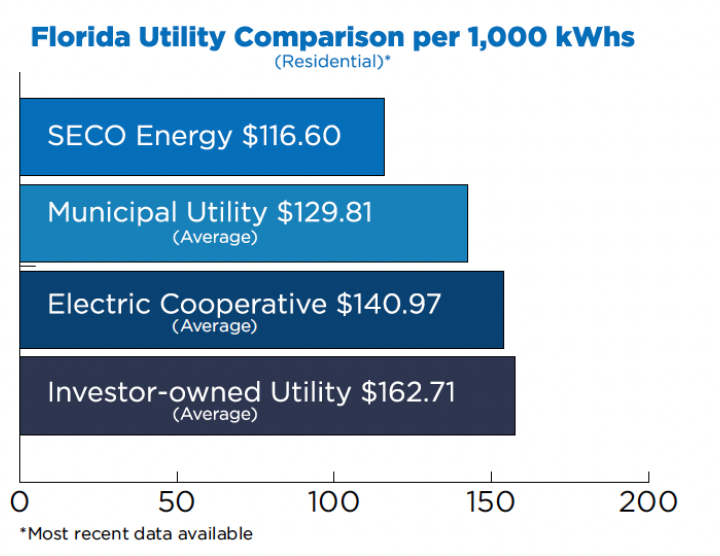 In alignment with Seminole’s projections, SECO’s Board of Trustees approved changing the PCA to lower our members’ bills. Both SECO and Seminole are not-for-profit cooperatives that work closely to ensure the lowest rates possible for our members. When the wholesale cost of purchased power decreases, SECO passes those savings along to you.
In alignment with Seminole’s projections, SECO’s Board of Trustees approved changing the PCA to lower our members’ bills. Both SECO and Seminole are not-for-profit cooperatives that work closely to ensure the lowest rates possible for our members. When the wholesale cost of purchased power decreases, SECO passes those savings along to you.
The Hot Bucks credit will reduce SECO Energy’s cost for residential service per 1,000 kilowatt hours (kWh) from $146.60 to $116.60 with bills generating as of October 1. The chart below compares SECO Energy’s residential cost for 1,000 kilowatt hours (kWh) with other Florida utilities.
This reduction places SECO Energy’s cost per kWh in a competitive position: lower than the average Florida Investor-owned, Municipal and Cooperative utility.
Our Mission, as a not-for-profit cooperative is to provide reliable and innovative energy services to our members and communities. Ensuring affordable energy service is a key component to fulfilling our role as your trusted source for energy solutions.
Best regards,
Curtis Wynn
Chief Executive Officer
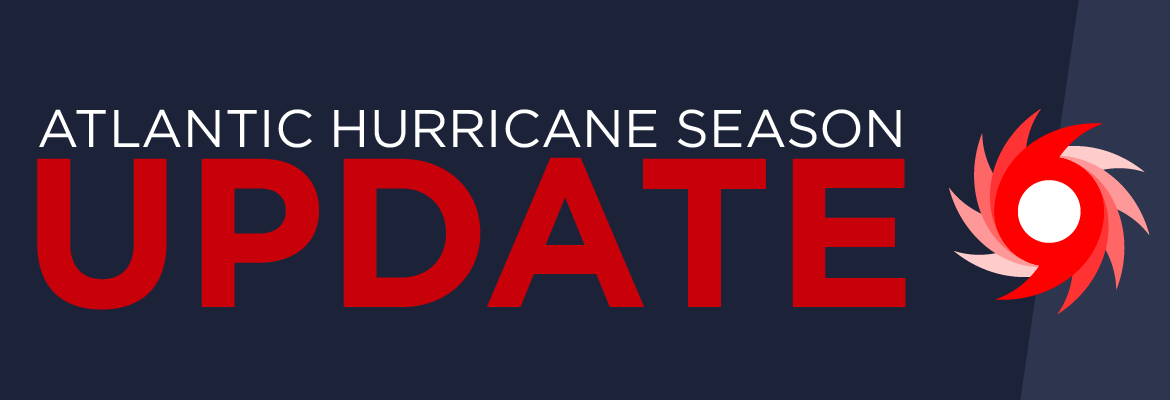
We have reached the mid-point of the Atlantic hurricane season (June 1 – November 30). In early April, experts from Colorado State University’s (CSU) Tropical Weather and Climate Research forecast below-average hurricane and tropical storm activity this season.
The outlook has changed in mid-season. CSU is now predicting “above-average” levels of named and major storms with 18 projected this year. Nine of these storms will develop into hurricanes and four will be major hurricanes.
Not only are we faced with the possibility of higher-than-average tropical storm and hurricane activity this year, but CSU experts also predict the probability of a major hurricane making landfall in the United States is above the historical long-term average. As a reminder, a major hurricane is a Category 3-5 with sustained winds of at least 111 mph or greater.
STORM CONDITIONS AT ODDS?
While this forecast creates concern, there are uncertainties as to how two major weather conditions may influence the storm activity we ultimately experience in Florida. The warmer-than- normal Atlantic Ocean waters and a particularly strong El Niño weather pattern are conflicting signals. The El Niño climate pattern often breaks up storms in the Atlantic and tropics, but researchers are unsure if this pattern will continue with the extremely warm ocean waters.
Hurricanes and tropical storms form most often in September, which is why now is a good time to refresh your emergency hurricane supplies if you haven’t done so. At the time of this column printing, this year’s storms include Tropical Storms Arlene, Bret and Cindy formed in June, and Subtropical Storm Don formed in July.
Remain indoors and prepare to wait out the weather safely during a storm. Crews are dispatched to begin restoration only after wind speeds are less than 35 mph. If you shelter away from home, assess your home to make sure it is safe before you return. For homes with damage, turn off your main breaker if it is safe to do so. If appliances are wet, turn off each appliance’s breaker and then unplug. Contact a licensed electrician for repairs.
Most important, focus on your family’s safety. Stock up on hurricane essentials – buy early. When a storm approaches supplies sell out quickly.
The SECO Energy Hurricane Handbook is your one-stop guide to being StormReady before, during and after a storm. Before a storm arrives, bookmark both our outage reporting and notifications platform StormCenter and our Daily Restoration Plan map on your smartphone or tablet. Find these tools at SECOEnergy.com.

Visit your county’s EOC website and sign up for alerts from your local Emergency Operations Center (EOC) for resources such as shelter information, storm planning, evacuation orders and more.
To enroll in your county’s emergency alerts, visit www.FloridaDisaster.org. Enter the county or city and follow the enrollment link. Program your county’s number on your phone or bookmark the page in your smartphone for quick access.
MEDICALLY NECESSARY SERVICE AND SPECIAL NEEDS REGISTRY
Through the Florida Department of Health, persons with special needs can register with their local emergency management agency to receive assistance during a disaster. Visit www. FloridaDisaster.org to add your name or a loved one’s to the statewide registry.
Registering provides first responders with valuable information to prepare for disasters or other emergencies to meet citizens’ unique needs. Providing as much information as possible will allow emergency management officials to plan accordingly for future disasters. You will be emailed periodically to verify the information provided is correct and to make any necessary changes.
Unless you plan to seek shelter at an approved facility, back-up generation is critical if you are a member who relies on lifesaving medical equipment powered by electricity.
CITRUS COUNTY: SheriffCitrus.org > Emergency Management or (352) 249-2775
HERNANDO COUNTY: HernandoCounty.us > Departments > Emergency Management or (352) 754-4083
LAKE COUNTY: LakeCountyFL.gov > Services > Emergency Management or (352) 343-9420
SUMTER COUNTY: SumterCountyFL.gov > Government Services > Emergency Management or (352) 689-4400
LEVY COUNTY: LevyDisaster.com or (352) 486-5213
MARION COUNTY: MarionSo.com > Emergency Management or (352) 369-8100
PASCO COUNTY: PascoCountyFL.net > Live > Disaster Preparedness or (727) 847-8137
Go to SECO Energy’s STORMCENTER to report an outage, check the status of an outage, see the estimated time of restoration, report an area light outage and manage your notifications.
Read the full September 2023 SECO News.




